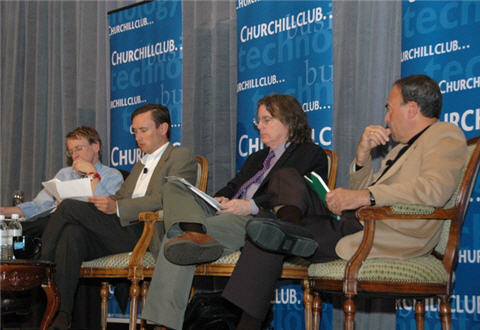Churchill Club: 9th Annual Top Ten Tech Trends

The Churchill Club held its "9th Annual Top Ten Tech Trends Debate" at the San Jose Fairmont last week. Four of the the top venture investors gave their predictions gave their predictions on the top tech trends emerging over the next few years. The event was moderated by Tony Perkins, editor in chief of AlwaysOn, and the speakers included:
- John Doerr, Partner, Kleiner Perkins Caufield & Byers
- Steve Jurvetson, Managing Director, Draper Fisher Jurvetson
- Roger McNamee, Co-Founder, Elevation Partners
- Joe Schoendorf, Partner, Accel Partners
Roger McNamee sees Apple continuing to excel in consumer electronics with its vertically integrated approached to building products. "The market for mobile devices is about to undergo a really dramatic fragmentation and you will see a huge proliferation of design centers, and I beleive a radical change in the philosophies underlying the creation of these products," McNamee said. He pointed to the iPod and Blackberry as the kind of design centers with specific functionality advantages that Motorola, Nokia and others with more fragmented approaches will have to chase.
The iPhone, he said, is not a substitute for anything in the market today--it's a substitute for the iPod with a phone built in. No single product or design center will take care of all mobile information and entertainment needs. "You will move the brains of your phone from one device to another and you'll do it the way you change shoes," McNamee said. John Doerr said that the Apple iPhone will be the biggest single thing in the world of technology next year, because there are 100 million iPods and all the users are trained to synch them with their PC.
Doerr forecasted that the FCC would approve at least one new broadband network in the next year, which could break the duopoly of the telecoms and cable companies. "If they make it ubiquitous and free or nearly free, it will be transformation and the iPhone and other devices are really going to displace PCs." He also making broadband freely available would be the most important move for the economy in the next 10 years. He seems to know something that we don't yet about the proposals before the FCC for new wireless spectrum allocation and services. Doerr also said that going green is the largest economic opportunity and imperative for the 21st century, and called for mandatory caps worldwide on greenhouse gas emissions.
Steve Jurvetson predicted that big advances are happening in memory, not logic processors. Today the majority of Intel transistors shipped are used for memory and will be in the future, but they don't do it very well, he said. A raft of innovators have been working for the seven or so years on self assembling molecular electronics--molecular layers or carbon nanotubes, which to be used are simply splashed on a wafer and spun. However, this technology doesn't lend itself to logic chips, which don't consist of repeatable, homogeneous patterns, he added. "If memory and logic bifurcate, the way you design chips and think about computers and the way you build all these complex systems will change. Memory will be relatively cheap and logic relatively expensive. It will flip the priorities of chip industry for the last 20 years and allow Moore’s Law to continue," Jurvetson said.
In the next year, we can expect to see synthetic life forms in the form of microbes, living things that reproduce in a lab environment, Jurvetson said. "When you can do that, you can write code in parsimonious way and can bring intelligent design to the information systems and biology. You can do purposeful work instead of random cut and paste and knock outs and what have you. It will dramatically accelerate the ability of the biotech industry broadly defined to do things in industrial biotech initially, not even thinking about the long term implications of medicine and other fields. In the near term, using these bugs to harvest energy from sun and to produce biofuels from diverse feed stocks are producing very compelling applications. The reason is that nature has clean, inherently green ways of doing this."
Joe Schoendorf predicted that the next 50 years is about video, and the Google, EBay of that space has not been created. YouTube may be one of the early ones, he said, and there will be four or five giants that emerge. He also said that changes in the G7 composition will change perspectives on who is the customer, what is market and who are competitors. Over the next five to ten years only one of the current G7 will be included in the group. China, India, Russia (counted in the G8) and Brazil are on the horizon, with France, Germany, Italy, Japan and the United Kingdom on the decline, Schoendorf said.
On the subject of Web 2.0 and the enterprise, Schoendorf also claimed that consumers are taking over the enterprise IT. "We bring to work what we are going to use," he said, which will be especially true for the new generation coming into the workforce. He exaggerates, but tools such as wikis and instant messaging are increasing becoming acceptable, and more reliable and secure, for enterprises."It's stunning to think that just a dozen years ago there was no Web browser," Doerr chimed in.
